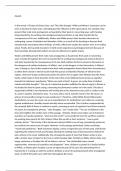Zaynah
In the novels ‘A Picture of Dorian Gray’ and ‘The Little Stranger’ Wilde and Waters’ characters can be
seen as haunted in many ways, extending past the influence of the supernatural. For example, they
present their male main protagonists as haunted by their pasts in conversing ways, with Faraday
being haunted by his working-class background whereas Dorian is only later haunted by the
consequences of his sins. Additionally, Waters and Wilde present their haunted characters as
undergoing a sense of isolation and alienation, either as a result of the haunting or because their
haunted state exacerbates these feelings, of which reflects the society the authors were in or writing
about. Finally, the haunted characters in both novels experience psychological torment because of
their haunting, allowing both authors to exercise adherence to gothic tropes.
Waters and Wilde present their male main protagonists as haunted by their pasts in conversing
ways: Faraday throughout the novel is haunted by his working-class background whereas Dorian is
only later haunted by the consequences of his sins. Both authors do this to present a discussion on
the dangerous of reckless hedonism, in Wilde’s case, or the dangers of class hierarchies, in Waters’
case. In doing so, they further explore how their male protagonists almost allow their circumstances
to affect them: Dorian’s eternal youth made him pursue a hedonistic lifestyle, of which he later
regrets, whereas Faraday continuously pushes his desires for an upper-class lifestyle onto the Ayres
family, which leads to their downfall. At the end of the novel, Wilde presents Dorian as regretful
towards his hedonism, questioning “What was youth at best? A green, an unripe time of shallow
moods and sickly thoughts.” The use of a rhetorical question solidifies the idea of regret in Dorian as
he doubts the time he spent young, contrasting his demeanour earlier on in the novel. This idea is
supported by Wilde’s own intentions with writing the novel, wherein he once said in a letter to the
St. James's Gazette, that Dorian Gray, “is a story with a moral. And the moral is this: All excess, as
well as all renunciation, brings its own punishment.” therefore, whilst Wilde himself did practise
Aestheticism, he uses the novel, not as an advertisement for aestheticism, but rather as a warning
against aestheticism’s hostility toward morality when uncontrolled. This is further compounded by
the semantic field of illness in relation to youth, conveying a sense of repulsion from Dorian towards
his youth, for example the phrases, “sicky thoughts,” and “unripe time.” The use of sibilance in the
lines also heighten the sombre tone of the passage. Similarly, Waters also makes use of rhetorical
questions as Faraday questions, “what was the result?” as he pondered over the sacrifices made by
his working-class parents for him. Waters follow this up with a short sentence, “I was a good,
ordinary doctor.” The brevity of the statement contrasts Wilde’s use of long, meandering sentences
but achieves the same sense of regret. However, in this passage particularly, Dorian concludes,
“Youth had spoiled him.” Both characters display a sense of regret because of their past, with Dorian
regretting the actions he took and Faraday allowing his working-class embarrassment to dictate his
later actions in the novel. Additionally, the retrospective point of view that Waters writes in also
adds a further layer of regret to the tone in which Faraday talks. Similarly to Wilde, Waters later uses
longer sentences as Faraday lists off his failures, such as, “the mishandled cases, missed
opportunities, moments of cowardice and disappoint.” Here, sibilance is present in a similar fashion
to Wilde, as Waters gives Faraday a sense of regret because of his past, thus presenting him as
haunted by it. In doing so, both the authors attribute a sense of haunting towards their protagonists’
pasts, of which they both carry with them throughout the novel.




